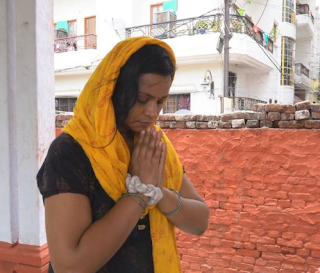Is it a temple or a mosque? Hindus go to court in India
In more than ten areas in India, Hindus are aiming to replace existing mosques with temples. This new Hindu religious ardour is straining Hindu-Muslim ties.
Varanasi, one of the world's oldest cities, is tense. In Varanasi's Gyanvapi Mosque, there are minarets, a dome, and five daily prayers.
 |
Sita Sahu, 40, is adamant: "It was never a mosque."
The structure was clearly a temple. One of the 17th-century white mosque's walls appears like an old brown temple wall. Historians agree that Aurangzeb razed a Hindu god Shiva temple and built the modern mosque on its foundations.
Under the mosque's dome, has the building always been a temple? Sahu agrees. She and four others want to worship Hindu gods at a mosque. Sita says the outer wall has a carving of Shringar Gauri. Women want to break down the mosque's walls to see if any gods remain.
This case has escalated mosque tensions. All entrances and access roads are carefully secured, and the dome is barricaded.
The mosque's counsel argued the court should have rejected Sahu's plea. He cites 1991's Places of Worship Act. It states that a house of worship must retain its religious character as of August 15, 1947, India's independence day. This is not the case. challengeable legally A judge declared in 1942 that the Gyanvapi Mosque and land are Islamic community property.
This rule was designed to prevent religious riots in India, which can easily result from such conflicts. An enraged mob of Hindus razed Babri Mosque in Ayodya a year after the law took effect, sparking religious violence. Riots murdered 2,000 Muslims.
BJP has long wanted to build a temple to the god Ram on the site of the demolished Babri Mosque. The SC permitted this in 2019. This was possible because the case predated 1991 and was a religious exception. 2020: Modi built the foundation.
In 2019, the Supreme Court ruled that mistakes from the past cannot be corrected.
Fanatical Hindus want to pull down any mosque built on the ruins of a Hindu temple before 1991. "It legalises savage invaders' criminal activities," a Supreme Court counsel said.
Hindus are challenging the existence of mosques and Islamic monuments. Even UNESCO World Heritage Sites like the Taj Mahal and Qutub Minar can't escape this.
Yadav, the lawyer for Varanasi's mosque management, says this threatens India's secular character. "Our constitution guarantees religious freedom for all. Religions are equal. Sahu and others may say this area is important to Hindus, but the mosque is too."
Sahu anticipates Yadav's arguments to protect the mosque to fail. "Muslims realise it's a temple. They'll realise we need the space for ceremonies."

Comments
Post a Comment